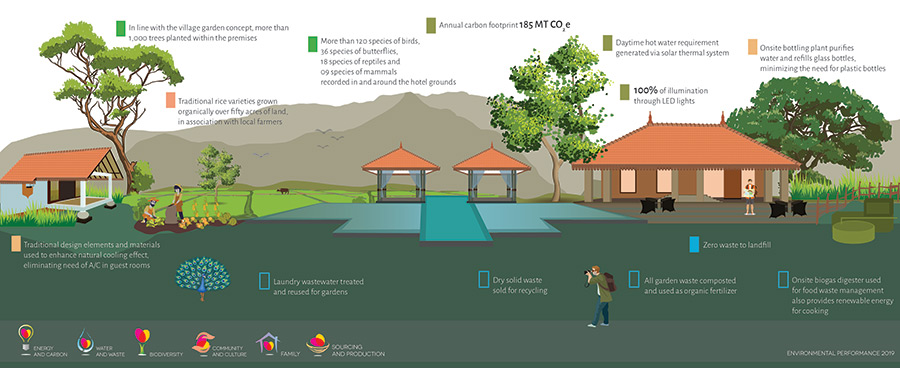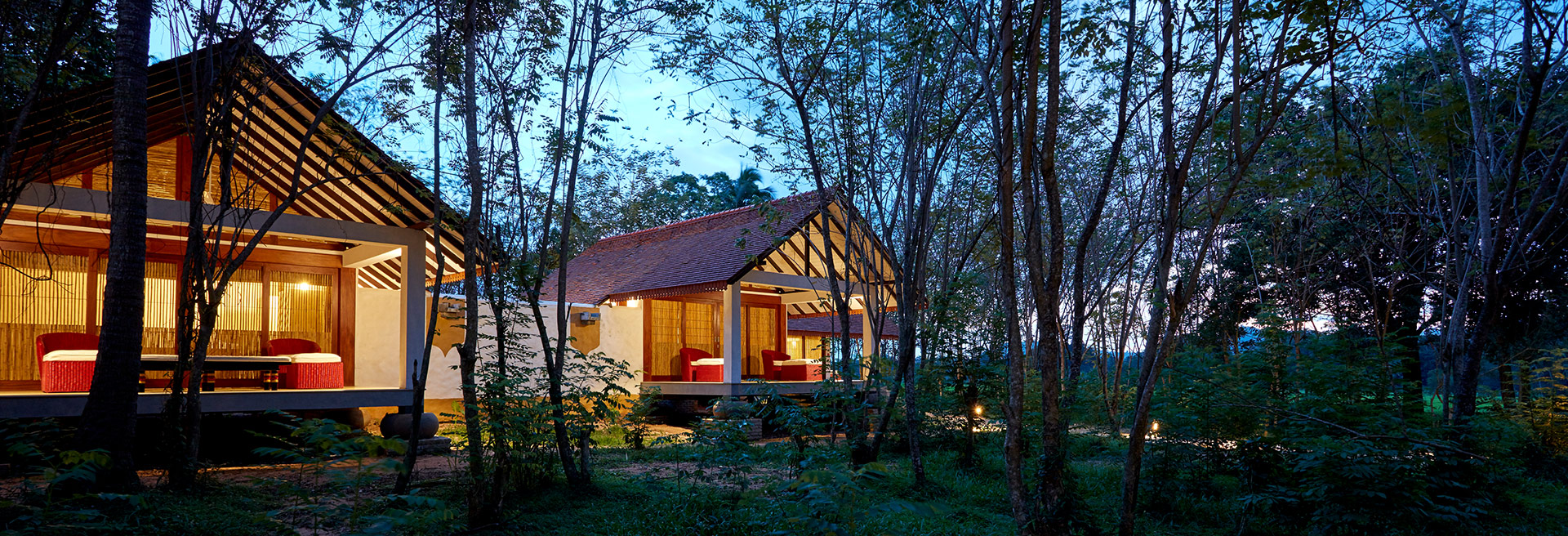Sustainability
A Harmonious Haven of Luxury and Sustainability
As an agro-luxury hotel in Sri Lanka, sustainable tourism is at our core. Staying true to our family values of responsible citizenship and caring for the landscapes that surrounds us, Jetwing Kaduruketha is committed to a number of sustainable initiatives that set an example for our communities, environments, and the world associated with our homes of Sri Lankan hospitality across the island.

Energy and Carbon
The architecture of Jetwing Kaduruketha has been designed for maximum natural illumination and ventilation. No air conditioners are used within the property, as natural cooling occurs through the use of bamboo walls and perforated door sashes, which allow the exchange of air. Additionally, high-pitched roofs and traditional eaves also allow for the collection and dispersal of warm air.
Jetwing Kaduruketha also features a centralised hot water system, where all our hot water is generated through 100% renewable energy. Using 24 flat-plate collector type solar hot water panels, excessive heat that is absorbed during the day is stored within in a calorifier (that holds up to 3000 liters) for use in the night.
Furthermore, all cooking in the staff cafeteria is fuelled through sustainable means – specifically two cooking stoves fuelled by biogas generated from our onsite biogas digester, along with an industrial biomass stove fuelled by cinnamon wood. Finally, our associates are often seen commuting around the hotel premises on tricycles and bicycles – forms of zero direct emission transport, with two of the latter also available in each room for your use.

Water and Waste
All organic waste generated at Jetwing Kaduruketha is treated and recycled onsite. All food waste generated from hotel operations and tree clippings from around the garden (when necessary) are fed into our onsite biogas digester, which later supplies biogas to the staff kitchen for cooking, and produces sludge that is used as a nutrient-rich soil enhancer. In addition, all garden sweepings and other tree clippings from the grounds of Jetwing Kaduruketha is composted, where the product compost is also used as a nutrient-rich soil enhancer across our gardens and organic farm.
Finally, all kitchen wastewater at Jetwing Kaduruketha is directed through a grease trap. This intercepts most floating grease and solids before they enter our wastewater disposal system, and proceed to a soakage pit. Similarly, all laundry wastewater is sent to our wastewater treatment plant before being directed into a soakage pit.

Biodiversity
Although built on a verdant expanse of 60 acres, Jetwing Kaduruketha occupies only 10 in order to immerse you in the thriving greenery that surrounds us. Designed to seamlessly integrate with the natural environment, Jetwing Kaduruketha was built to resemble a traditional village, complete with native vegetation and undisturbed habitats that were inspired by home gardens. As a result, our premises boast over 100 tree species, most of which have been marked with their names to improve your awareness of our resident vegetation. A number of these include indigenous fruit trees, which have also attracted an abundance of wildlife. The flying squirrel in particular, is a frequent visitor during the budding season of mango trees, while over 120 species of birds including several endemics, have been recorded at Jetwing Kaduruketha. A nesting tree of the baya weaver can be spotted on the fringes of our resident paddy field, while the elusive fishing cat also makes a rare appearance within our habitats.

Community and Culture
The paddy lands of our home in Wellawaya have shaped the way of life for local farming communities for over 2500 years. Over time, bountiful harvests have transformed into small-scale paddy cultivation where farmers often find themselves in debt after loans to assist with their yield. With nearly 50 acres of our home serving as traditional paddy land, Jetwing Kaduruketha has provided local farming families with seed money (per acre, per season) that is used for cultivation expenses of this land area. The harvest is then shared equally between the farmer and the hotel, where our portion is used for all meals prepared on the property. Furthermore, any excess stocks of rice are sold to other hotels in our family with a small mark-up to compensate for the seed money given to farmers, as they are not required to pay back the money given to them. As the excess quality produce is distributed at a lower rate, we unearth a multitude of benefits for all parties involved.
Aimed at empowering micro-, small-, and medium-scale enterprises around our hotels, Thrive – a grassroots project, seeks to provide local businesses with avenues to build their capacity, apply for and obtain certification and licenses, and gain financial assistance to become lucrative enterprises.
First launched at Jetwing Kaduruketha, Thrive programme saw tuk-tuk drivers in the village undergo a chauffeur training programme, assisted female entrepreneurs in the locality to build their capacity and expand their businesses, as well as set up a Farmer Field School to share knowledge and expertise among the local farmers about sustainable and organic agriculture, just to name a few. Several local producers were coached on improving the quality of their products, and meeting regulations and guidelines to obtain Good Manufacturing Practice and Good Agricultural Practice certifications that can assist in their endeavours to reach a wider market across the island.

Sourcing and Production
With our verdant location amidst a working paddy land where both cultivation seasons draw bountiful harvests, Jetwing Kaduruketha is self-sufficient in its production of rice, enjoying the benefit of sharing any excess produce among other hotels in our family as well. The local farmers use age old traditional practices passed down through generations of farming families to grow a diverse variety of organic rice such as pachchaperumal and kahawanu, which are laden with nutrition. In addition, we also maintain a thriving organic farm on our property. Staying true to our Field to Fork initiative, vegetables such as capsicum, brinjal, lettuce and more are grown, harvested, and prepared by our kitchen as nutritious meals for your pleasure. A point to note is that our farm uses only compost produced on-site and slurry from the biogas plant as a liquid fertiliser, with no added chemical substances at any given point in time. Finally, all glass water bottles used within Jetwing Kaduruketha are bottled at our onsite plant, minimising both plastic waste and the carbon footprint from transporting them.

At Jetwing Hotels, we’re committed to minimizing our environmental footprint and fostering positive social impacts. We welcome your feedback on our sustainability efforts, including suggestions for how we improve. Please share your thoughts and ideas with us at sustainability@jetwinghotels.com

